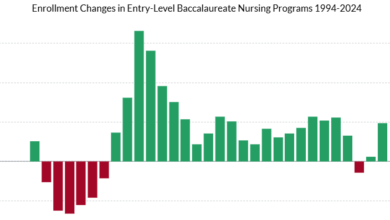Nurses facing ‘lottery’ for essential DBS check costs

Nurses are among public sector workers facing a “lottery” when it comes to who pays for essential criminal record checks, Unison has said.
New research from the union, published this month, has shown that four in ten (42%) frontline workers in roles requiring these checks are being forced to pay for their own by employers.
All employers in England and Wales can use a Disclosure and Barring Service (DBS) to investigate a prospective employee’s criminal record, no matter what role they are applying for.
For certain roles, including working in healthcare or with children, employers can request a more detailed DBS check.
“The law should be changed to stop rogue employers from docking money for work essentials such as these checks”
Jon Richards
In its report, Unison found that while employers are legally responsible for ensuring patients and the public are safe, many are still pushing the responsibility and cost of criminal record checks onto their staff.
The union said there is a “lottery” of who has to pay for the DBS check and warned that the amount some staff were being charged by their employers also varied.
The report also revealed disparities in which staff members were being faced with additional costs, noting that bank staff were often having to pay for their own DBS checks while their colleagues on permanent contracts were being reimbursed.
A bank nurse in Greater Manchester, named only as Jackie, said: “I think it is wrong that bank staff have to pay for this, especially when staff who have a permanent position get it paid for.”
Meanwhile, the report found that NHS staff who took on a second job as bank staff or with agencies were also being asked to pay for a second records check themselves.
Fiona, a nurse in Edinburgh, said: “I worked for two NHS trusts in my career.
“I joined the staff bank and was informed I had to pay £50 to join despite already working in the trust.”
The report highlighted that the workers most likely to lose out in this lottery were women, those in the lowest paid jobs and overseas workers.
Unison warned that employers were “putting up financial barriers” for potential staff, which would not help the ongoing recruitment and retention crisis happening in the public sector.
According to the survey, over two thirds (69%) of staff who do not currently pay for DBS checks would be put off applying for a job where they would have to meet the cost themselves.
Jessica, a nurse in Yorkshire, said: “Given that I have worked here for almost 20 years, I find it quite frustrating that I had to pay for this.
“We are so short staffed in my team. If the hospital is serious about trying to recruit then it should cover the cost of checks.”
During the pandemic, the fee for DBS checks was waived for health and social care applicants to ensure services could quickly hire the staff they needed.
Unison has called for this to happen across all public sector services, and for the law to be changed so that employers cannot pass essential costs of working onto their staff.
Unison’s assistant general secretary, Jon Richards, said: “Criminal record checks are vital and bosses have a legal duty to carry them out.
“The law should be changed to stop rogue employers from docking money for work essentials such as these checks.
“Such a seemingly small change would make a huge difference to the tens of thousands of staff who currently have to pay for their own checks.
“People are being put off applying for jobs and even going for promotion because of the cost, which is no good for them or their employers.”





